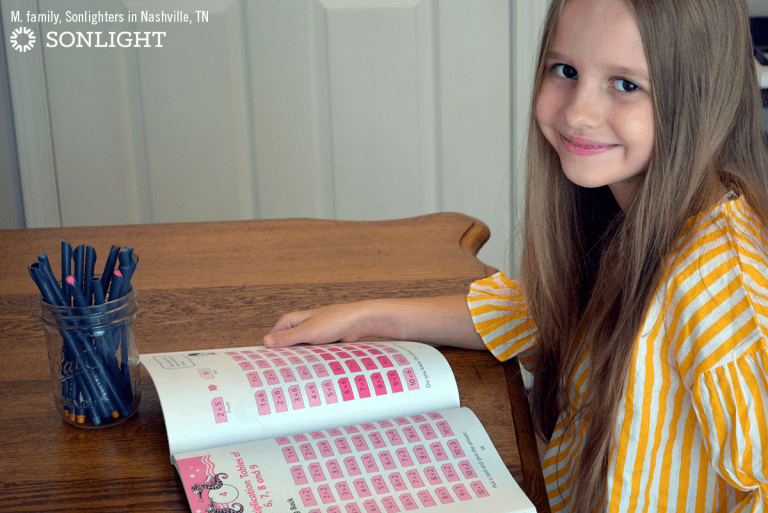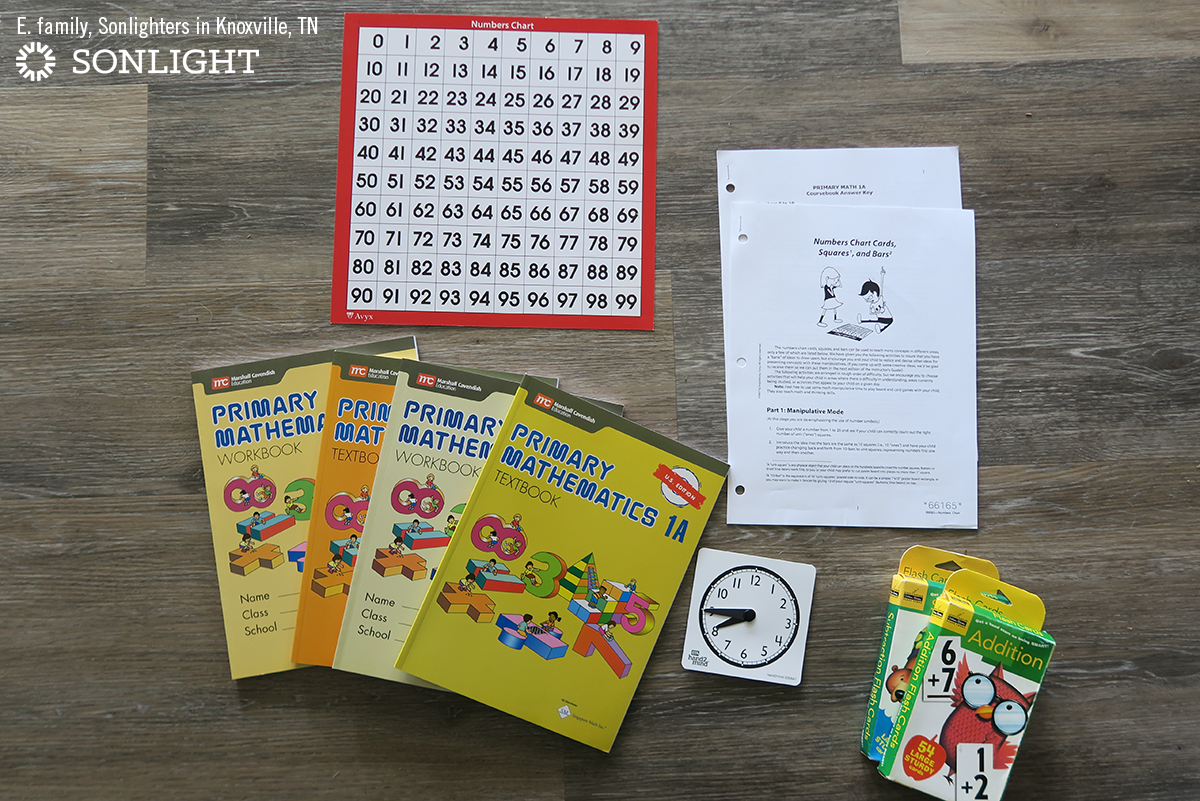Singapore Math is just one of many fantastic math options Sonlight offers. If you are happy with your math program, don’t switch! I’m not raving about Singapore to stir up discontent or doubt. I'm just sharing our experience which may help you find your place in the wild west of math curricula.

Sonlight staff has helpfully recapped the pros and cons of each Sonlight math curriculum, Singapore included. Before you start comparing them, you might want to read through this guide to Choosing the Best Homeschool Math Curriculum. In it, you’ll learn how your personal preferences can help—not hinder—as you navigate what each curriculum offers.
Singapore Math Doesn’t Follow Conventional American Thought
Primary Mathematics by Marshall Cavendish publishers—commonly referred to as Singapore Math—approaches math instruction in ways not common in the United States. Why is that worth mentioning? Because this program was developed using the same approach followed by Singaporean students. In Singapore, students consistently demonstrate exceptional math skills in global test rankings. (Students from the United States, sadly, score many tiers lower in the same rankings.)
Of course, to poorly paraphrase John Donne, “No curriculum is an island.” Singapore’s famed success in math is also a reflection of cultural beliefs about math—namely that everyone can succeed in reading and math. Math also tends to be integrated into extracurricular activities.
But certainly, we can start by cultivating positive attitudes toward math. Then we can explore ways in which Singapore Math differs from more traditional offerings.
Singapore Math Increases Conceptual Understanding
With so many solid choices for homeschool math, why have I stuck with Singapore Math curriculum? My own frustrations with math as a child led me to search for a program which clearly explains why math calculations work.
The study of math has two main components:
- arithmetic (calculations)
- mathematics (concepts and theory)
While Singapore isn’t weak on arithmetic, it places a high value on conceptual understanding. A greater understanding of mathematical theory leads to fewer mistakes in arithmetic calculation. Rather than memorizing and blindly repeating a series of steps, the Singapore-trained student understands why he or she is executing these steps.
Since so much frustration in math stems from simply not understanding, a program which takes time to stop and explain why has the potential to dramatically reduce frustration.
Singapore Math Strengthens Mental Math Skills
I was talking to a friend recently about my daughter’s Singapore lesson, and she exclaimed, “That’s how I’ve always done math in my head!”
This piqued my curiosity, so I asked a group of people how they solve—or estimate—math problems if they don’t have access to a calculator or piece of scratch paper. While most used the familiar borrowing and carrying method on paper, very few carried out that same traditional borrowing and carrying process mentally. Instead, when it came to solving problems mentally, the vast majority used processes which grouped like numbers together very much like the strategies taught in the Singapore method.

It’s important to point out, though, that Singapore doesn’t ignore traditional methods of calculation. Students are exposed to multiple strategies. I truly believe learning more than one method of solving each type of problem increases not only conceptual understanding but also overall success in math.
Singapore Math is Neither Spiral Nor Mastery
You’ll hear ample chatter both for and against in any homeschool forum, but Singapore Math themselves says Primary Mathematics is neither spiral nor mastery. I like that!
The mastery approach can get repetitive, bogging students down; and the spiral method can sometimes move too quickly, leaving students behind. Singapore Math’s unique “concrete to pictorial to abstract” approach combines the best of both worlds, leading to a fuller understanding of math.
Singapore Math Instructs the Parent-Teacher in the Singapore Method
Unless you used a similar curriculum as a child, your explanations are more likely to fall on the traditional side. If you’re worried your personal math prowess isn’t good enough to teach in a truly Singapore way, don’t be!
The Home Instructor’s Guide is your key to the Singapore methodology. You simply need to have a teachable spirit and the willingness to read each lesson aloud from the Home Instructor’s Guide. The HIG, as it’s been nicknamed by homeschool moms, will guide you and your student through each concept.
Other Considerations About Singapore Math
Personally, I’ve been extremely happy with this math program. But there are a few reasons it might not be the best choice for you. (I love how homeschooling allows parents the flexibility to map out a custom educational plan for each individual student!)
For instance, if you prefer to stick with the same publisher from kindergarten through high school, you won’t be able to do that with Singapore Math. The program ends at eighth grade, progressing as follows:
- Earlybird A and B (Kindergarten),
- Primary Mathematics (Grades 1-6), and
- New Elementary Mathematics (Grades 7-8).
If you have particularly strong feelings in support of traditional arithmetic (time drills, emphasis on computation put over concepts, etc), then you likely will not enjoy the abstract and out-of-the-box approach Singapore takes to some solving strategies.
The grade level designations on each book don’t always match up with the student’s actual grade level, either. It’s not uncommon for a student to take a Singapore Math placement test and land in a level or two lower than expected. Don’t fret; this is not unusual, especially if you’re new to the Singapore method. (I sometimes use correction tape or stickers to cover up grade numbers on school books before we use them.)
The full strength of the program really does lie in the Home Instructor’s Guides. So if you are looking for an independent program you can simply hand to your student, only popping in periodically to correct answers from a teacher’s key, Singapore will not be a good match. But if you’re willing to take advantage of the detailed Home Instructor’s Guides, and are open to approaching math thoughtfully, logically, and unconventionally, then Singapore Math is likely to be an ideal fit for you.
If you still aren't sure which math to choose, Sonlight has homeschool consultants available to help. Click here to schedule an appointment.







Fantastic article! A clear and engaging explanation of Singapore Math and its benefits for learners.
I have never heard of this before. I am homeschooling my 8 year old son so I will definitely be checking this out. Thanks